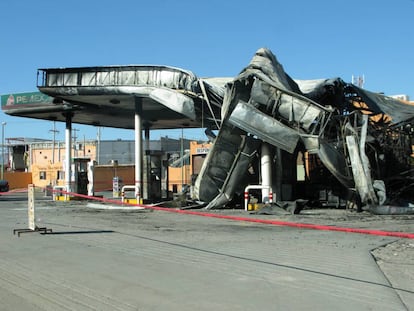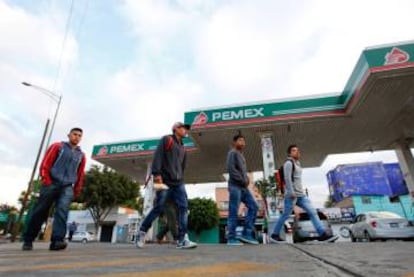Mexico’s lethal gasoline smuggling problem
Huge explosion at filling station in north of country highlights dangers of illicit trade


Around 9.40 pm on October 24, the Mexican-US border city of Ciudad Juárez was shaken by a huge explosion.
Local residents initially assumed the blast was a bomb set off by one of the country’s warring drug cartels, but responsibility lay with a man who was filling containers with 14,000 liters of cut-price gasoline. When a spark ignited the fuel, it set off a huge blaze.
Mexico intends to liberalize its filling stations from January 1, 2017
The reason the man was buying gasoline in Ciudad Juárez rather than in his home town of Casas Grandes, some 280 kilometers away in the state of Chihuahua, is that it was 25% cheaper.
Gasoline prices in Mexico are set by the government. When President Enrique Peña Nieto partially liberalized the country’s oil industry in 2013, he decided to lower the price of gasoline by 25% in filling stations within a 45-kilometer belt along the US border.
This was an attempt to end the long-standing practice among Mexicans in northern states of traveling into the United States, where gasoline is cheaper, to fill up their vehicles.
The result has been a flourishing trade in cut-price gasoline bought at the border stations.
For example, the man at the Ciudad Juárez filling station would have paid $7,850 for 14,000 liters of gasoline. The same amount costs around $10,400 in the rest of the country.

Staff at border filling stations who engage in the illegal trade face prison terms of up to 25 years, but many are prepared to take the risk for a cut of the profits.
State-owned Pemex, which has the monopoly on gasoline distribution in Mexico, forbids the sale of fuel in unauthorized containers. Nevertheless, many small rural communities, often in remote areas, club together to buy cut-price gasoline.
Mexico intends to liberalize its filling stations from January 1, 2017. The country’s Energy Regulation Commission (CRE) will select a number of areas where gas stations will be able to set their own prices depending on supply and demand, a move that is expected to push prices down in those areas.
Gasoline distributors in Mexico have also complained about serious shortages in central and northern areas in recent years due to theft of gasoline from pipelines and deposits that sometimes leave pumps dry at filling stations around the nation.
English version by Nick Lyne.
Tu suscripción se está usando en otro dispositivo
¿Quieres añadir otro usuario a tu suscripción?
Si continúas leyendo en este dispositivo, no se podrá leer en el otro.
FlechaTu suscripción se está usando en otro dispositivo y solo puedes acceder a EL PAÍS desde un dispositivo a la vez.
Si quieres compartir tu cuenta, cambia tu suscripción a la modalidad Premium, así podrás añadir otro usuario. Cada uno accederá con su propia cuenta de email, lo que os permitirá personalizar vuestra experiencia en EL PAÍS.
¿Tienes una suscripción de empresa? Accede aquí para contratar más cuentas.
En el caso de no saber quién está usando tu cuenta, te recomendamos cambiar tu contraseña aquí.
Si decides continuar compartiendo tu cuenta, este mensaje se mostrará en tu dispositivo y en el de la otra persona que está usando tu cuenta de forma indefinida, afectando a tu experiencia de lectura. Puedes consultar aquí los términos y condiciones de la suscripción digital.








































